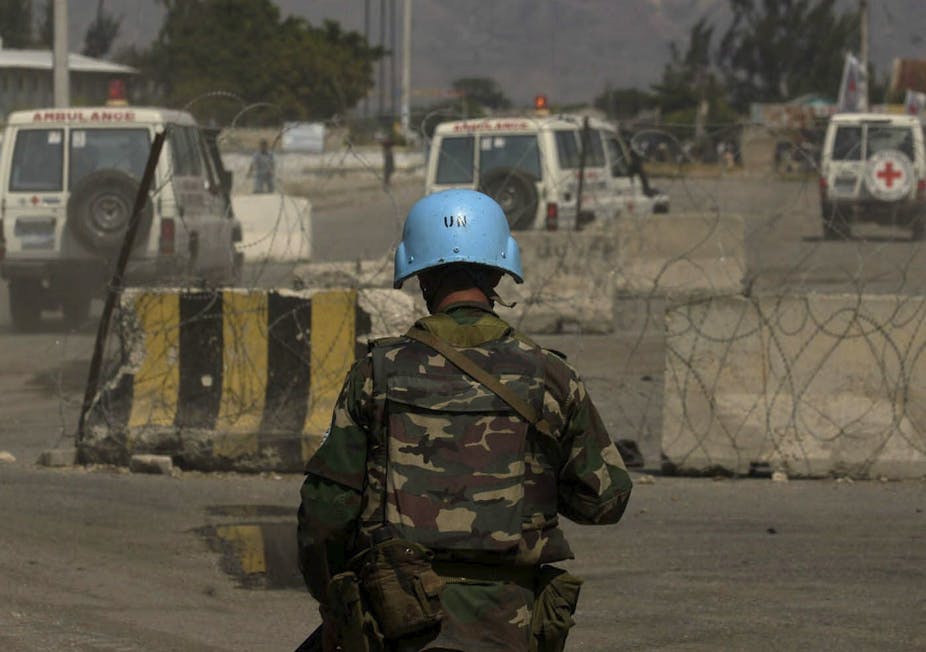The NGO, Aids Free World, has released a copy of a report on sexual violations committed by UN peacekeeping personnel.
The UN’s opaque nature means that rather than address the points made by the independent experts, the report was not circulated – but copies of it were leaked to Aids Free World, which sent it to the ambassadors and permanent representatives of every UN member state.
Sexual violence in peacekeeping has long been recognised as a central problem that must be addressed. Allegations have emerged throughout the past 20 years. Sexual violence by peacekeepers has not been limited to a particular region, mission, or to troops from certain countries.
In countries as diverse as Angola, Bosnia and Herzegovina, Cambodia, Democratic Republic of the Congo (DRC), East Timor, Eritrea, Kosovo, Liberia, Mozambique, Sierra Leone, and Somalia, numerous examples of rape, paedophilia, prostitution, and other forms of sexual exploitation and abuse have come to light in recent decades.
This much is true: cases of UN personnel being involved in sexual violence have been catching international attention for years, with particular focus on the missions in Liberia and Congo, among others. And for years there has been vociferous public condemnation of the abuse of women and children by civilians and troops operating under the UN banner.
Not enough
The increasing attention to sexual exploitation and abuse in UN peacekeeping, especially from the global media, has led to a number of measures being taken by the UN – albeit to little effect.
In 2002, the UN created a Task Force on Protection from Sexual Exploitation and Abuse in Humanitarian Crises. Then, in 2003, then Secretary General Kofi Annan issued the Special Measures for Protection from Sexual Exploitation and Sexual Abuse Bulletin. In 2004, Annan appointed Prince Zeid Ra’ad Zeid Al-Hussein of Jordan to act as his Adviser on Sexual Exploitation and Abuse, in turn leading to the 2005 Zeid Report. And in 2007, the General Assembly adopted a strategy on assistance to victims as well as a resolution on criminal accountability of UN officials or experts on missions.
Despite such attention, but limited action, on sexual violence and peacekeeping, the leaked independent expert report demonstrates that the same concerns exist as have done for the past 20 years – and that the situation may in fact be deteriorating.
The expert report emphasises that the culture of peacekeeping missions has changed very little, and the incidence of sexual violence around them is accordingly still very high. It says:
Overall, there was noted a culture of enforcement avoidance, with managers feeling powerless to enforce anti-SEA rules, a culture of silence around reporting and discussing cases, and a culture of extreme caution with respect to the rights of the accused, and little accorded to the rights of the victim.
Rather than addressing these issues, the UN Secretary-General and his staff have tried to sweep them under the carpet. They neither showed or circulated the report to states, nor referred to any of its contents in the annual report to states on progress against sexual violations committed by UN peacekeeping personnel.
Of course, the UN is not known for transparency in its work. Whereas it does have the reputation for seeking to protect its own interests over those of the states and the people that it serves. This is particularly pronounced where it comes to peacekeeping activities.
Recent years have seen the introduction deadly diseases into a country, oil-for-food and sex-for-food scandals, child prostitution, and the beating and murdering of locals. The list goes on and on.

Why then is the UN apparently set on avoiding making the changes necessary to eliminate such crimes and abuses, or at least reduce their incidence? The answer lies in peacekeeping’s growing importance around the world, and its very precarious circumstances.
Growing need
Since the early 1990s, peacekeeping missions have sprung up all over the world. With many states increasingly fragile thanks to resource scarcity, drastic environmental changes, the rise of extremist non-state actors, and “regular” armed conflicts, it is highly likely that more and more peacekeeping missions will be required in coming years.
These missions are vital. They are at the centre of conflict resolution, protection of civilians, peace-building, and state-building; they not only ensure stability inside fragile states, but also protect international peace and security.
To staff the missions, the UN relies upon more than 300,000 peacekeepers, a number incorporating international civil servants, national police personnel, and most numerous of all, troops from national militaries.
These people work in some of the most difficult and dangerous places in the world, and none of them are legally required to do so. Similarly, troop-contributing countries have the option of withdrawing their support and forces from missions whenever they wish.
That means that UN peacekeeping always works under the threat that countries will pull out of missions. Any serious attempts to prosecute and punish perpetrators could make it very difficult to secure the forces needed for the missions to function.
It therefore does not serve the UN’s interests to create ways of holding individuals accountable for their crimes and abuses. Ultimately, despite the fact that its every peacekeeping mission is mandated to protect civilians, the UN fails to focus on the countless victims of abuses committed by people acting under its banner.
Instead, its impulse is to protect the perpetrators, providing a cloak of impunity for crimes and abuses. That leaves the people who most need protecting by the international community exposed to grave harms at the hands of the very UN peacekeepers sent to keep them safe.

